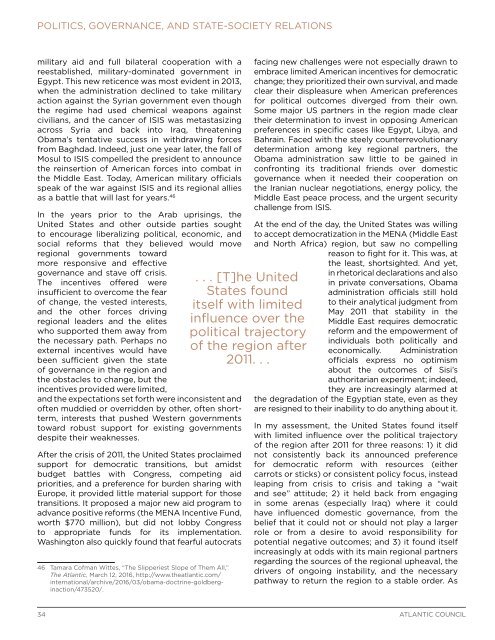POLITICS GOVERNANCE STATE-SOCIETY RELATIONS
Politics_Governance_and_State-Society_Relations_web_1121
Politics_Governance_and_State-Society_Relations_web_1121
Create successful ePaper yourself
Turn your PDF publications into a flip-book with our unique Google optimized e-Paper software.
<strong>POLITICS</strong>, <strong>GOVERNANCE</strong>, AND <strong>STATE</strong>-<strong>SOCIETY</strong> <strong>RELATIONS</strong><br />
military aid and full bilateral cooperation with a<br />
reestablished, military-dominated government in<br />
Egypt. This new reticence was most evident in 2013,<br />
when the administration declined to take military<br />
action against the Syrian government even though<br />
the regime had used chemical weapons against<br />
civilians, and the cancer of ISIS was metastasizing<br />
across Syria and back into Iraq, threatening<br />
Obama’s tentative success in withdrawing forces<br />
from Baghdad. Indeed, just one year later, the fall of<br />
Mosul to ISIS compelled the president to announce<br />
the reinsertion of American forces into combat in<br />
the Middle East. Today, American military officials<br />
speak of the war against ISIS and its regional allies<br />
as a battle that will last for years. 46<br />
In the years prior to the Arab uprisings, the<br />
United States and other outside parties sought<br />
to encourage liberalizing political, economic, and<br />
social reforms that they believed would move<br />
regional governments toward<br />
more responsive and effective<br />
governance and stave off crisis.<br />
The incentives offered were<br />
insufficient to overcome the fear<br />
of change, the vested interests,<br />
and the other forces driving<br />
regional leaders and the elites<br />
who supported them away from<br />
the necessary path. Perhaps no<br />
external incentives would have<br />
been sufficient given the state<br />
of governance in the region and<br />
the obstacles to change, but the<br />
incentives provided were limited,<br />
and the expectations set forth were inconsistent and<br />
often muddied or overridden by other, often shortterm,<br />
interests that pushed Western governments<br />
toward robust support for existing governments<br />
despite their weaknesses.<br />
After the crisis of 2011, the United States proclaimed<br />
support for democratic transitions, but amidst<br />
budget battles with Congress, competing aid<br />
priorities, and a preference for burden sharing with<br />
Europe, it provided little material support for those<br />
transitions. It proposed a major new aid program to<br />
advance positive reforms (the MENA Incentive Fund,<br />
worth $770 million), but did not lobby Congress<br />
to appropriate funds for its implementation.<br />
Washington also quickly found that fearful autocrats<br />
46 Tamara Cofman Wittes, “The Slipperiest Slope of Them All,”<br />
The Atlantic, March 12, 2016, http://www.theatlantic.com/<br />
international/archive/2016/03/obama-doctrine-goldberginaction/473520/.<br />
. . . [T]he United<br />
States found<br />
itself with limited<br />
influence over the<br />
political trajectory<br />
of the region after<br />
2011. . .<br />
facing new challenges were not especially drawn to<br />
embrace limited American incentives for democratic<br />
change; they prioritized their own survival, and made<br />
clear their displeasure when American preferences<br />
for political outcomes diverged from their own.<br />
Some major US partners in the region made clear<br />
their determination to invest in opposing American<br />
preferences in specific cases like Egypt, Libya, and<br />
Bahrain. Faced with the steely counterrevolutionary<br />
determination among key regional partners, the<br />
Obama administration saw little to be gained in<br />
confronting its traditional friends over domestic<br />
governance when it needed their cooperation on<br />
the Iranian nuclear negotiations, energy policy, the<br />
Middle East peace process, and the urgent security<br />
challenge from ISIS.<br />
At the end of the day, the United States was willing<br />
to accept democratization in the MENA (Middle East<br />
and North Africa) region, but saw no compelling<br />
reason to fight for it. This was, at<br />
the least, shortsighted. And yet,<br />
in rhetorical declarations and also<br />
in private conversations, Obama<br />
administration officials still hold<br />
to their analytical judgment from<br />
May 2011 that stability in the<br />
Middle East requires democratic<br />
reform and the empowerment of<br />
individuals both politically and<br />
economically. Administration<br />
officials express no optimism<br />
about the outcomes of Sisi’s<br />
authoritarian experiment; indeed,<br />
they are increasingly alarmed at<br />
the degradation of the Egyptian state, even as they<br />
are resigned to their inability to do anything about it.<br />
In my assessment, the United States found itself<br />
with limited influence over the political trajectory<br />
of the region after 2011 for three reasons: 1) it did<br />
not consistently back its announced preference<br />
for democratic reform with resources (either<br />
carrots or sticks) or consistent policy focus, instead<br />
leaping from crisis to crisis and taking a “wait<br />
and see” attitude; 2) it held back from engaging<br />
in some arenas (especially Iraq) where it could<br />
have influenced domestic governance, from the<br />
belief that it could not or should not play a larger<br />
role or from a desire to avoid responsibility for<br />
potential negative outcomes; and 3) it found itself<br />
increasingly at odds with its main regional partners<br />
regarding the sources of the regional upheaval, the<br />
drivers of ongoing instability, and the necessary<br />
pathway to return the region to a stable order. As<br />
34 ATLANTIC COUNCIL



